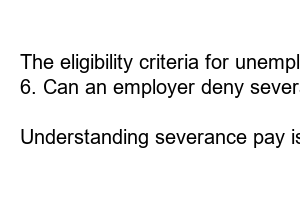퇴직금 조회
Title: Demystifying Severance Pay: Everything You Need to Know
Introduction:
Are you curious about severance pay? As an employee, it’s essential to be aware of the benefits and rights that come with your employment package. This blog post will provide you with a comprehensive guide to understanding severance pay, answering all your questions and shedding light on this important aspect of employee compensation.
Subheading 1: What is Severance Pay?
Severance pay is a sum of money that an employer may provide to an employee upon termination of their employment contract. It serves as financial support during the transition period between jobs, helping employees cover expenses until they secure new employment.
Subheading 2: Why is Severance Pay Offered?
Employers offer severance pay as a gesture of goodwill and recognition of an employee’s contributions. It also helps to alleviate the financial burden that can arise from sudden unemployment. Severance pay may also be included in employment contracts or collective bargaining agreements.
Subheading 3: How is Severance Pay Calculated?
The calculation of severance pay typically depends on several factors, including an employee’s length of service, salary level, and the terms defined in their employment agreement. In some cases, severance pay can be a set amount, while in others it may be calculated using a specific formula considering years of service.
Subheading 4: Is Severance Pay Mandatory?
In most jurisdictions, including the United States, severance pay is not legally mandated by labor laws. However, some industries or companies may have internal policies that require severance pay, or it can be included in employment contracts. Make sure to review your employment agreement or consult with your HR department to understand your specific situation.
Subheading 5: Are There Exceptions to Severance Pay?
Certain situations, such as misconduct or voluntary resignation without just cause, may exempt employees from receiving severance pay. Additionally, some countries or states may have specific regulations or conditions under which severance pay is not applicable. Understanding the legal framework of your location is crucial in determining your eligibility.
Subheading 6: Negotiating Severance Pay
If you find yourself in a position where your employment is being terminated, it’s crucial to know that severance pay is negotiable. Engaging in open and honest conversations with your employer can help you advocate for a fair and reasonable severance package based on your individual circumstances.
Frequently Asked Questions:
1. Can I negotiate my severance pay?
Yes, severance pay is negotiable. Consider consulting with an employment attorney or seeking guidance from employment support organizations for assistance in negotiating the terms of your severance package.
2. How is severance pay taxed?
Severance pay is generally subject to taxation. The tax treatment will vary depending on your country’s tax laws and regulations. It’s advisable to consult with a tax professional to understand the specific implications in your situation.
3. Will I receive severance pay if I’m laid off due to company downsizing?
In cases of downsizing or restructuring, it’s common for employees to be eligible for severance pay. However, this will depend on your employment contract and any collective bargaining agreements in place.
4. Is severance pay always a lump sum?
Severance pay can be provided as a lump sum or in installments, depending on the terms defined in your employment agreement or collective bargaining agreement.
5. Can I apply for unemployment benefits while receiving severance pay?
The eligibility criteria for unemployment benefits while receiving severance pay varies across jurisdictions. In most cases, severance pay may affect your eligibility or the amount you receive. Check with your local labor department to understand the rules in your area.
6. Can an employer deny severance pay?
Employers can deny severance pay if an employee breaches specific contractual terms or engages in misconduct. However, it’s essential to review your employment agreement or consult with an attorney to determine the enforceability of such conditions.
Summary:
Understanding severance pay is crucial for employees facing termination or considering a change in employment. While not legally mandated in most jurisdictions, severance pay serves as a financial safety net during transitional periods. It’s important to know your rights, review your employment agreement, and engage in open discussions with your employer to negotiate a fair severance package tailored to your circumstances.

